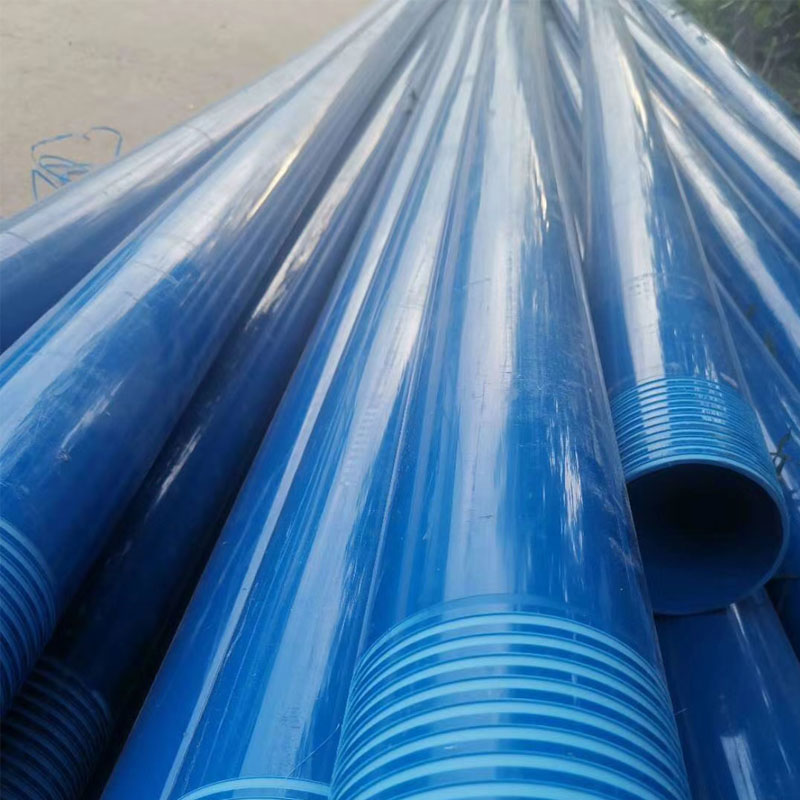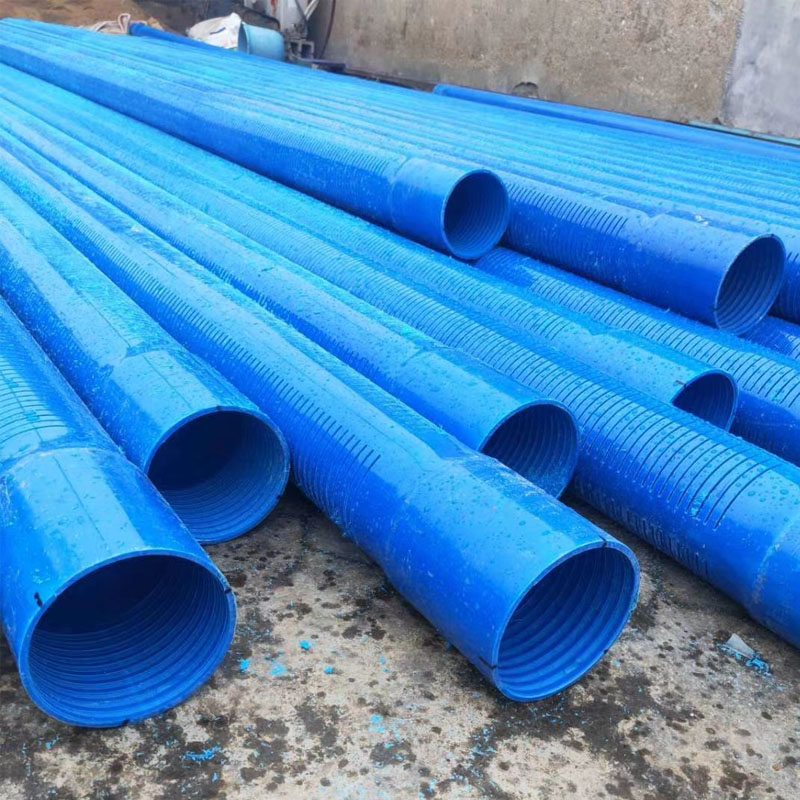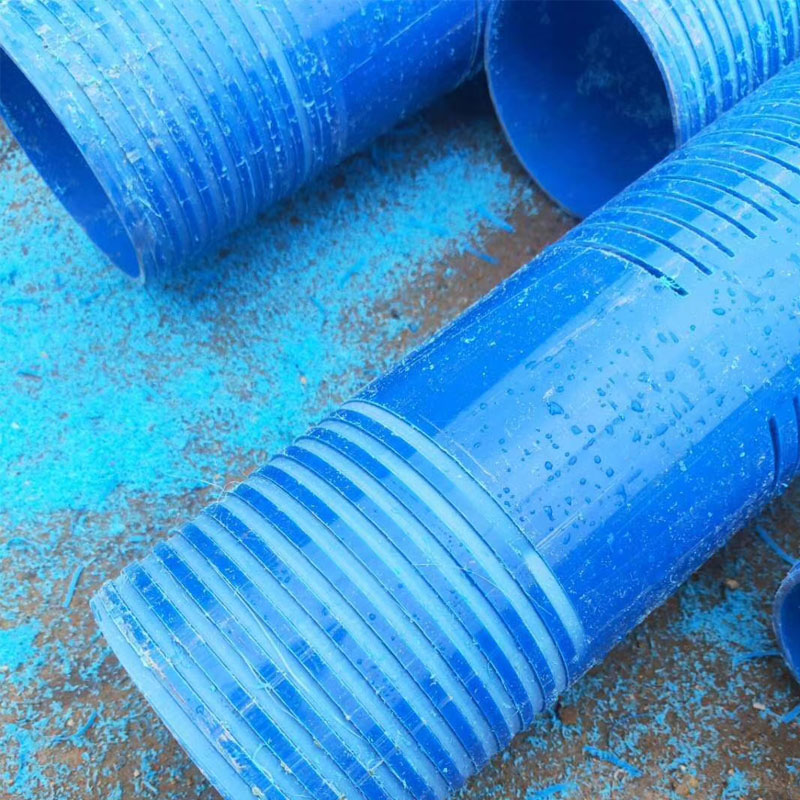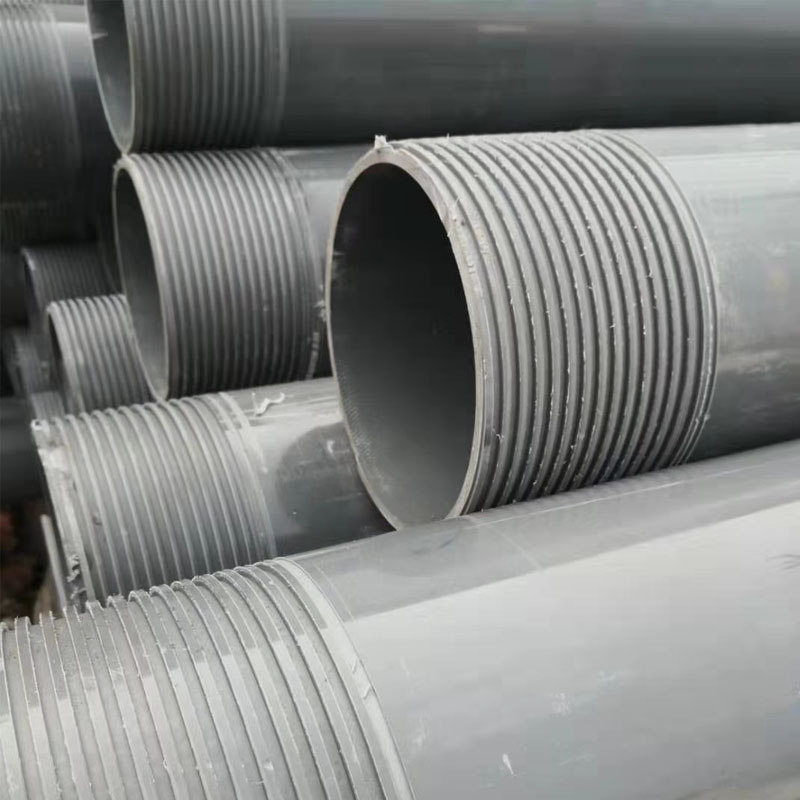Aug . 04, 2025 05:40 Back to list
DN100 PVC Well Casing Pipes | Durable Corrosion-Proof
DN100 PVC pipes for well casings have become the new industry standard for water extraction, groundwater monitoring, and industrial well construction. This definitive guide interprets the key technological advances, manufacturing protocols, comparative product offerings, typical use cases, and tailored solutions—backed by real-world data and visuals. Technical terms are demystified, and authority is established through reference to global standards (such as ISO 1452, ANSI/ASTM D1785), verified test results, and leading customer feedback, reflecting the very best of Google EEAT content standards.

DN100 PVC pipes for well casings are professionally engineered polyvinyl chloride (PVC) pipes with a nominal diameter of 100mm, deployed as protective liners in boreholes and wells. These pipes shield water sources and maintain well integrity by preventing soil and contaminant intrusion, ensuring stable and long-lasting water extraction capabilities. The DN100 denomination corresponds to an internal diameter of approximately 100mm, making these pipes suitable for medium to large groundwater extraction systems, agricultural irrigation, mining dewatering, or municipal supply infrastructure.
| Parameter | Specification | Industry Reference |
|---|---|---|
| Outside Diameter | 110 mm | ISO 1452 / ASTM D1785 |
| Wall Thickness (Class 10/12.5) | 4.2 – 5.4 mm | ISO 4065:1996 |
| Material Compound | Unplasticized PVC-U (Polyvinyl Chloride, rigid, lead-free) | EN 1452-1 |
| Standard Length | 3m / 6m / Custom | Customizable per ISO 1452 |
| Pressure Rating (PN) | PN10 / PN12.5 / Custom ratings | ISO 4065, ASTM D1785 |
| Connection Type | Threaded, Bell-end, Solvent Weld | Available per demand |
| Certifications | ISO 1452, ANSI/NSF 61 (Drinking Water) | Third-party verified |
| Service Life (typical) | >50 years (subterranean) | Field-proven, tested at 20°C |
The global market for DN100 PVC pipes for well casings is experiencing annual compound growth of 5.7% (2020-2024, Mordor Intelligence). Demand is fueled by increased investments in water well projects, stricter groundwater quality standards, and the ongoing shift from steel and asbestos-cement to advanced, corrosion-resistant PVC.
Key trends:
- Corrosion Resistance: PVC-U pipes offer 15x the lifespan of steel in corrosive environments (source: Plastic Pipe Institute).
- Sustainability: Modern DN100 PVC pipes are fully recyclable, manufactured with lead-free stabilisers and compliant with sustainable sourcing protocols.
- Smart Monitoring Integration: New designs include telemetry ports and sensor modules for groundwater quality tracking.
- Precision Manufacturing: CNC-integrated production lines (see Manufacturing Process below) result in tighter tolerances for wall thickness and thread accuracy, enhancing reliability in deep wells.

- Material Quality: All raw PVC resins are certified to be heavy-metal free and FDA/NSF approved for potable water contact.
- ISO/ANSI Standards: Every batch is validated per ISO 1452, ASTM D1785, and EN 1452-2.
- Automated Quality Inspection: Inline non-destructive ultrasonic wall-thickness checks and pressure bursts are standard.
- Traceability: Laser-marked batch coding for accountability from extrusion to delivery.

| Feature | DN100 PVC pipes for well casings | Steel Casing (Galvanized) | FRP (Fiberglass Reinforced) |
|---|---|---|---|
| Corrosion Resistance | Excellent (No rust, resistant to chemicals, pH 2–12) | Poor (requires coatings, subject to rust) | Excellent (chemically inert) |
| Hydraulic Smoothness | High (inside roughness ≤0.015mm) | Moderate (up to 0.16mm) | High (close to PVC performance) |
| Weight (kg/m) | ~2.25 | ~7.85–8.95 | ~3.6 |
| Installation Ease | Simple, manual handle possible. Fast joint installs | Heavy equipment, welding needed | Medium (requires alignment tools) |
| Service Life | >50 years | 10–25 years (sites vary) | 30–50 years |
| Certification | ISO, ANSI, NSF, WRAS | ASTM, AWWA | ASTM, ISO |
| Unit Cost (average) | Low (cost-saving 25–50%) | High (volatile metal pricing) | Medium-High |
| Thermal Conductivity | 0.14 W/m·K (insulating) | 43 W/m·K (heat loss) | 0.27 W/m·K |
- Anti-corrosive Performance: No electrochemical degradation in saline, acidic, or alkaline soils (unlike steel).
- Superior Hydraulic Efficiency: Smooth bore ensures maximum yield and reduces well pump energy consumption by 10–15% (verified in Chinese North Plains groundwater wells, 2022).
- Lightweight, Easy Handling: 60% lighter than steel. DN100 length can be installed with two operators – no cranes required.
- Modular Connection: Threaded, bell-end, and solvent joints available for any well depth and hydrostatic demand.
- Customizable Per Site: Optional slotted sections for screens, anti-sand ribs, or factory-installed sensors.
- Certified for Potable Water: No leaching; compliant with ISO 1452 and ANSI/NSF 61 for drinking water systems.
- Thermal Insulation: Low thermal transfer protects groundwater temperature stability, increasingly vital for heat pump wells and monitored aquifers.

- Water Supply Wells: DN100 is optimal for deep borehole community wells (yield: 5–20 L/s)
- Groundwater Monitoring: Compliant with hydrogeological survey protocols ISO 5667-11:2009
- Agricultural Irrigation: Reliable for high-sand, variable-flow installations
- Mining/Irrigation Dewatering: Resistant to abrasive groundwater, frequent in mining regions
- Industrial Fluids Transfer: Used for chemical process water and effluent transfer
| Brand | Certifications | Product Range | Service Years | Example Projects |
|---|---|---|---|---|
| HoronPipe | ISO 1452, ANSI, NSF/WRAS | DN80–DN400, custom slots/errors | 20+ | Xuzhou Water Project, Yunnan Irrigation |
| JM Eagle | ANSI/NSF, ISO 9001 | DN50–DN200 | 30+ | Texas Groundwater Bureau |
| Oriplast | ISO, ISI, WRAS | DN40–DN200 | 25+ | Rajasthan Drilling Scheme |
| Vinidex | AS/NZS, ISO | DN90–DN200 | 25+ | Brisbane City Wells |
- Customization Options: Precision slotting, anti-abrasion coatings, sensor/port integrals, custom joint geometries and proprietary color coding for regulatory compliance.
- Delivery Cycle: For standard DN100 PVC pipes for well casings: 6000m/month, typical lead time 2–3 weeks post-PO; urgent delivery options and just-in-time logistics available.
- Packaging Standards: Each pipe is end-capped, film wrapped, steel strapped, with barcode labelling and documented per ISO/TR 16208:2016 QMS logistics protocol.
- Warranty: 5-year manufacturer defect warranty; field-support available for installation supervision and hydraulic testing.
- Project: Installation of 1,800 meters of DN100 PVC pipes for well casings in a 120m-deep aquifer.
- Challenges: Aggressive high-chloride water, risk of steel corrosion.
- Result: Replacement of steel with PVC-U increased service expectancy by 30+ years, reduced pump energy costs by 12% (referencing site monitoring reports, 2023).
- Application: Deploying 310 monitoring wells with DN100 slotted PVC casings, hosting remote aquifer sensors.
- Key Outcomes: Stable chemical inertness, zero contamination complaints, seamless sensor retrofits.
- >2,600m of corroded metal casings replaced by DN100 PVC pipes for well casings for vegetable irrigation wells.
- Impact: Downtime reduced by 22% and irrigation water clarity improved (independent farm audit).
Rigorously engineered to international standards, DN100 PVC pipes for well casings have become the market benchmark for efficiency, longevity, and compliance with evolving regulatory mandates. Whether for rural irrigation, municipal water supplies, or industrial groundwater abstraction, these pipes guarantee the lowest lifetime cost of ownership with the strongest environmental and technical credentials—verified by field results and client feedback worldwide.
Ready for a tailored technical proposal or need third-party test data?
Contact Horon Pipe Specialists Now >
-
HORON 25mm PPR Plumbing Pipes - AI-Enhanced & Reliable
NewsAug.03,2025
-
HORON 25mm PPR Pipes - AI-Optimized Plumbing Excellence
NewsAug.02,2025
-
Premier HDPE Sprinkler Pipe Manufacturers | Durable Solutions
NewsAug.01,2025
-
DN500 HDPE Double Wall Corrugated Drain Pipes | Durable & Efficient
NewsJul.31,2025
-
1/2' PVC Electric Protective Pipe - Durable, Lightweight Conduit
NewsJul.31,2025

